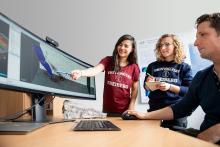It lies directly beneath our feet and is still used far too little: Geothermal energy. Yet it is an important component of the energy transition, as it is low in CO2 emissions, crisis-proof and weather-independent. Heat from underground can not only heat individual buildings, but also entire neighbourhoods. In future, the specialists for this future technology will also come from the TU Bergakademie Freiberg. The new German language Master's degree programme in Geothermal Energy will be offered there from the summer semester of 2025. Interested students with a Bachelor's degree can apply for the new course until 15 March 2025.

"Geothermal energy is a growth market," explains course director Professor Traugott Scheytt. "The new Master's programme prepares students specifically for a professional career in this field." This can look very different. Depending on their interests and previous knowledge, students put together a very individual specialisation profile: "They can focus on technologies for using heat, explore which methods can best be used to tap into the heat underground or look at the potential of mine water."
In practical terms, from April 2025, the course will focus on planning geothermal probes for near-surface geothermal energy and carrying out energy calculations. Reservoirs will be explored and characterised for open deep geothermal systems and geothermal storage facilities. This also includes modelling thermal propagation.
Special training for geothermal energy in three semesters
If you are interested in the climate-friendly use of geothermal energy and have a bachelor's degree in a geosciences or engineering course, TU Bergakademie Freiberg is the right place for you. In three semesters, students with a seven-semester Bachelor's degree acquire a specialised Master's degree in geothermal energy; for students with a six-semester degree, adaptation modules amounting to an additional semester are provided.
In addition to the basics of shallow and deep geothermal energy and hydrogeochemistry, the curriculum also includes business administration and law. "Freiberg is a place for doers: the degree programmes have a high practical component and offer access to modern laboratories and test rigs for drilling, mine water utilisation and water analysis. The latest software and extensive visualisation options for the three-dimensional recording and representation of the subsurface in virtual reality complement the teaching and ensure a practical education."
The university has had the topic of geothermal energy on its radar for a long time. Freiberg researchers have created a geothermal atlas and are informing local authorities and cities about the potential of heat from the earth. The new Master's degree programme is an exciting further development and is aimed at Bachelor's graduates who are interested in technological solutions for the challenges of the future.